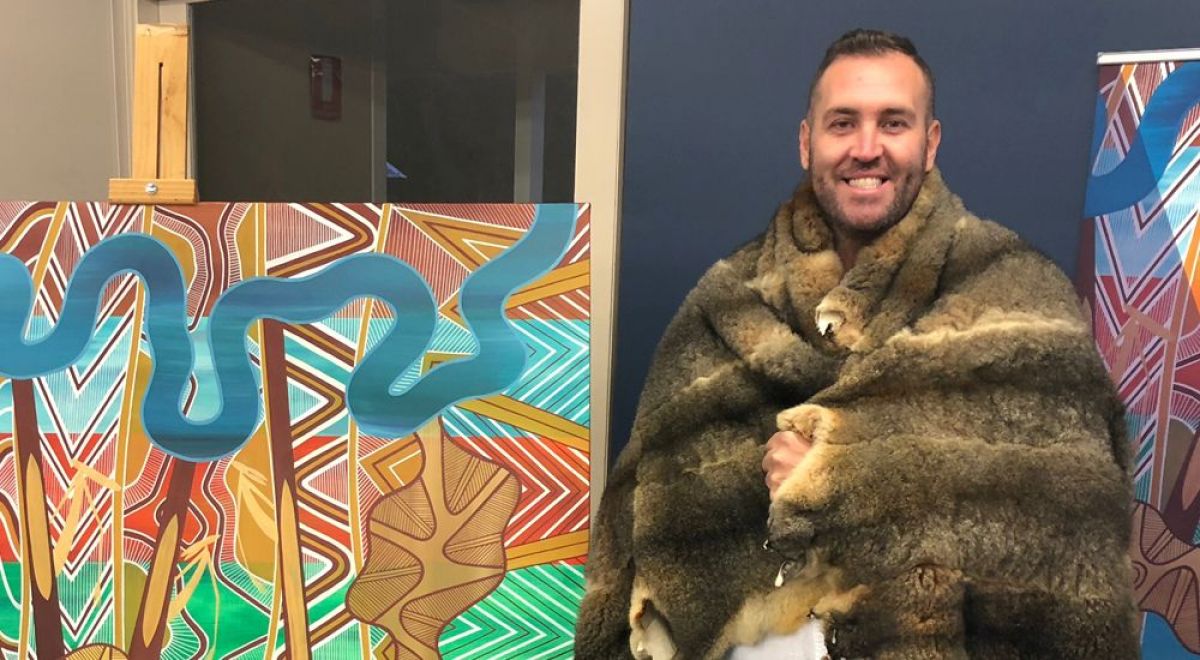
'For me and my peoples, Country and Self are one and the same. So, when our Country experiences trauma, so do I and so do my peoples.
Right now, we are facing a humanitarian crisis, but we also fronting a Country crisis. We need to listen more closely to what the land is telling us – quite literally, showing us – that it’s unhealthy and it’s suffering, along with its peoples, because of the bushfires.
And we need to keep in mind that Country is Self when we consider Traditional Owners and Aboriginal Victorians during this crisis. There’s a tendency for people to focus on the humanitarian side of environmental emergencies and disasters. We consider the needs of the people first and what we can do to help. Then we think about the land and impacts associated.
I think we need to think of people and Country as intrinsically linked, and not uncouple the process.
To provide some context for non-Aboriginal people, farmers have a connection to their land, to their bit of farm. They live on it and have built their family’s lives around it. They have worked it; they have farmed it; they have brought about economic opportunities from it; and they are personally and humbly connected to it.
Traditional Owners have a deep association and connection to land as well. It’s not that indifferent. It’s just a bit more deep-rooted or deep-seated, and we tie in a broader narrative. The main difference is that we have creation stories, ceremony, dance and language that explain our connectedness to Country.
Our peoples are thinking more broadly about the ecosystem, around how it fits into our biocultural values and our totem species.
For me and my Gunditjmara people, our totem moieties are the Yellow, and Red-Tailed Black Cockatoos. Similarly, Gunaikurnai have special connections to the pelican. It’s part of their creation story.
'The totems and stories may be different, but they are both part of our shared culture, our spirit, and our songlines. Just as cultural dance and ceremony is part of this shared culture.
Right now, my peoples’ totem species can’t land on Country and my people can’t dance on Country because it is burnt, or still burning, and it’s suffering.
But my people would say that the opportunity for us to re-set Country is now, and we want to be part of the process. I often hear at DELWP that “we’re in a recovery stage”.
I believe we’re in a resetting stage. Recovery is a part of any re-setting process, and the timing is right for me and my people and all Aboriginal peoples to be instrumental and influential in this resetting process – as supported by the current narrative in mainstream media regarding cool burns and cultural burns.
We understand, as Aboriginal peoples, how we want to be involved in managing land and water. We want to be self-determining. Re-setting country is not wholly governed by policy, but about undertaking cool burns and cultural burns in particular places and at certain times of the year.
There are reasons for this; namely, for our biocultural values. We understand that the decisions we make affect the broader ecosystem, including other peoples’ Country.
Currently, our elders can’t participate in ceremonial practices because to do so would be inappropriate given the trauma caused by the bushfires. We’re living in two worlds. Some of our peoples have lost their houses and homes to the fires, so they are being comforted and supported by their peoples in their communities.
The Wurundjeri people and the Bunurong people suffer a different kind of trauma every day. They look around their Country (across metropolitan Melbourne) and there is concrete and infrastructure everywhere. Their Country has been decimated by concrete.
There is trauma within their immediate communities and particularly when they travel into the city to do a Welcome or a smoking ceremony in a government building. They will often remark: “Look what’s happened to our Country”.
They understand that it’s about how we are going to work together moving forward.
It’s important that Aboriginal people are allowed the time and the space to connect with their Country and ensure that some of those sites that haven’t been recorded for very specific cultural reasons, are OK.
Gunditjmara elder, Uncle Dennis Rose, has told me that he wants to acknowledge DELWP’s Heywood office, along with the Heywood CFA for how they conducted themselves when our Country was burning, which led to unimaginable trauma for my people.
Uncle Dennis explained that DELWP and Heywood CFA did a fantastic job. It was a real solid partnership approach in going out on Gunditjmara Country with Gunditjmara people being beside them during the fires.
Gunditjmara people advised the crews on how best to navigate country and in particular the lava flows and volcanic rock which makes it even more of a challenge.
Historically, Traditional Owners haven’t been given due consideration by governments or agencies when conducting surveys or works on Country. However, in this instance, there was a genuine commitment to a partnership, which was welcomed by the Gunditjmara people.
You may have heard about the fire that ripped through Budj Bim National Park in Barwon South West, and in the process unveiled an ancient aquaculture system and evidence of the communities that once lived on this site.
For me and my people this is an exciting discovery, and at last, a more positive story arising as a result of the fires. Sadly, I’m yet to hear of positive stories coming out of Gunaikurnai Country.
This affects me deeply, because I want to be celebrating this discovery along with my Gunditjmara people; however, we have to be considerate and respectful of the Gunaikurnai people, who are still under threat from the fires.
We must be mindful that those people are suffering trauma, and the gravity of that trauma happening right now. Their Country is still on fire.'
Page last updated: 14/02/20